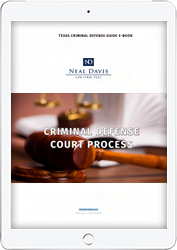
Reasons Why Criminal Charges are Dropped or Dismissed
Why might charges be dropped or dismissed before trial? Are dropped charges the same as dismissed in Texas?
If you face a criminal charge, you may be wondering how such charges can be dropped or dismissed. Houston attorney Neal Davis has succeeded in getting many charges dropped or dismissed throughout the course of his career, and he may be able to help you too.
First, though, we’ll answer a few common questions.
It’s worth noting that not all criminal charges go to trial. Indeed, many charges are dropped prior to trial during negotiations between prosecutors and defense lawyers. But it is only the prosecutor who can drop such charges.
That can happen when a knowledgeable criminal defense attorney such as Neal Davis represents you. Neal Davis knows about many factors which can weigh against the prosecution’s case, from insufficient evidence to lack of witness credibility to inadmissible evidence.
Neal Davis also understands that there’s an important difference between dropping charges and dismissing charges.
What Does It Mean When a Case is Dismissed?
In some ways they are the same, since each results in a defendant going free. But charges can be dismissed only after such charges have been filed. A charge can be dropped before or after a charge has been filed.
You may need a charge dropped by the prosecutor, or you may need a charge dismissed by the prosecutor, though a court also can dismiss a charge if the prosecutor has made a fundamental legal error in the case.
Either way, Neal Davis can help you.
Note: This article focuses on achieving a dismissal on active or pending criminal charges. For those interested in obtaining dismissals on past cases, please see our related article about Expunction: How to Clear Your Criminal Record in Texas.
Wrongful convictions and exonerations are rising across the U.S. Find out what’s causing this disturbing trend and what can be done to stop it.
Why Do Prosecutors Drop Charges?
As for why prosecutors drop charges, that can be due to many factors. Among them is when a victim in a criminal charge — a victim around whom the case is built — decides not to cooperate. The victim may have changed his or her mind, and it’s then pointless for the prosecutor to proceed without more evidence.
Here are five other possible reasons why your attorney might be able to get your charges dropped or dismissed:
- Insufficient evidence. A prosecutor may drop a criminal charge if it is determined that the evidence against the accused isn’t strong enough. Or, perhaps new evidence is found which undercuts the prosecution’s case against the defendant. Your attorney may be able to intercede with the DA and prosecutors when first reviewing police reports and argue that there is no basis for bringing a formal charge against in the first place you due to insufficient evidence. If charges get filed regardless of insufficient evidence, then our attorney can file a motion of case dismissal.
- Fourth Amendment violations. The Fourth Amendment protects citizens against unlawful searches and seizures by police, investigators, and law enforcement. Any evidence illegally obtained can and should be excluded from the case. Prosecutors may drop a criminal charge if it’s determined that some of their evidence was legally obtained and is inadmissible in court. A skilled defense attorney can show if that has happened, perhaps due to police failure to get a proper warrant to search for evidence. Any evidence found without securing a proper warrant is then deemed inadmissible and may lead to a prosecutor dropping or dismissing the criminal charge.
- Procedural issues. Police and prosecutors must follow strict criminal procedures when arresting, booking, interrogating, setting a bail hearing, or engaging in pretrial activities. If a defendant’s rights are violated, these procedural errors may actually be grounds for a case dismissal or sentence reduction. However, these issues can be complicated, so it is important you work with a skilled and knowledgeable defense attorney.
- Lack of resources. The reality is that prosecutors and district attorneys often deal with far too many cases than they are able to handle. As a result, they may be forced to allocate their time and resources to certain priority cases, while dropping or dismissing minor crimes. This is more likely if you’re accused of a minor crime and you have no previous criminal record.
- Willingness to cooperate. If prosecutors find that you are willing to work with authorities to help solve other crimes or help in some other circumstance, they might be convinced by your attorney to work out a deal where they reduce your sentence or drop/dismiss your case altogether.
In the case of Fourth Amendment violations, police can search a person, house or car without a search warrant in some circumstances. If police have reasons to believe an arrested person is carrying a criminal weapon, a search can be made.
Police can also search a vehicle after arresting the driver for driving while intoxicated (DWI). Or police can go into a house without a search warrant in the event of an emergency, such as shots being fired.
A charge may, however, be dropped if it’s found that the suspect was subjected to an illegal stop or there was lack of probable cause to make an arrest. Police must have a reasonable belief, based on clear facts, that an arrest is appropriate. Police cannot arrest you due to a gut feeling or “profiling” your race.
In any event, your defense lawyer can make the case for you that a charge should be dropped by pointing out these reasons to prosecutors.
Why Do Courts and Prosecutors Dismiss Charges?
After charges are filed, prosecutors and sometimes courts may dismiss such charges for some of the same reasons that charges are dropped before being filed. Evidence may be poor, witnesses may be unavailable or illegal tactics may have been used to gather evidence or make arrests.
Again, a criminal defense attorney can advance this process, which is best done early in legal proceedings, or during what’s known as a pretrial negotiation phase.
Before going to court for a trial, a defense lawyer can argue that the prosecution’s case will not prevail at trial and urge the prosecution to dismiss or drop the charge. The prosecution may counter with an offer to reduce the charge. Your attorney then may counter that even the reduced charge will not prevail in court.
What Is a Grand Jury Dismissal?
As for what is a grand jury dismissal, that occurs when a grand jury is convened to consider indictment on a charge, and it’s determined that the case isn’t strong enough. The grand jury then can dismiss or “no-bill” the charge, or the prosecutor can dismiss it. Prosecutors prefer doing that rather than spending time prosecuting a case they cannot win.
Again, grand jury dismissal can occur only before the chance of a grand jury indictment.
What About Reducing a Charge?
You may wonder about the possibility of reducing a charge. This can be done when the evidence isn’t strong enough for a certain charge, but it may be strong enough for a lesser charge.
Prosecutors then may offer a “plea bargain agreement.” That occurs when prosecutors agree to dismiss the original charge if the defendant agrees to plead guilty or no contest to a less severe charge instead.
Neal Davis can guide you and protect your legal rights in plea bargain agreements. He even may advise you to reject such an agreement if the case against the original charge is weak.
Keep in mind that, under Texas law, in most cases the original charge would not be expunged or taken off your record after a plea bargain agreement, even though you did not go to trial on that charge. However, if you faced the original charge and weren’t convicted, it could be expunged from your criminal record.
How to Get Your Charge Dropped or Dismissed
As you can see, there are many ways to get your charge dropped or dismissed. But for that to happen, first you need to see a knowledgeable criminal defense attorney such as Neal Davis.
Neal Davis is no stranger to examining factors such as insufficient evidence, Fourth Amendment violations, and procedural errors. He has succeeded in getting many charges dropped or dismissed before a case goes to trial – and he may be able to help you, too.
Get a legal review of your case today
Criminal Defense Court Process
FREE E-BOOKLearn all about the legal process and your legal rights.


